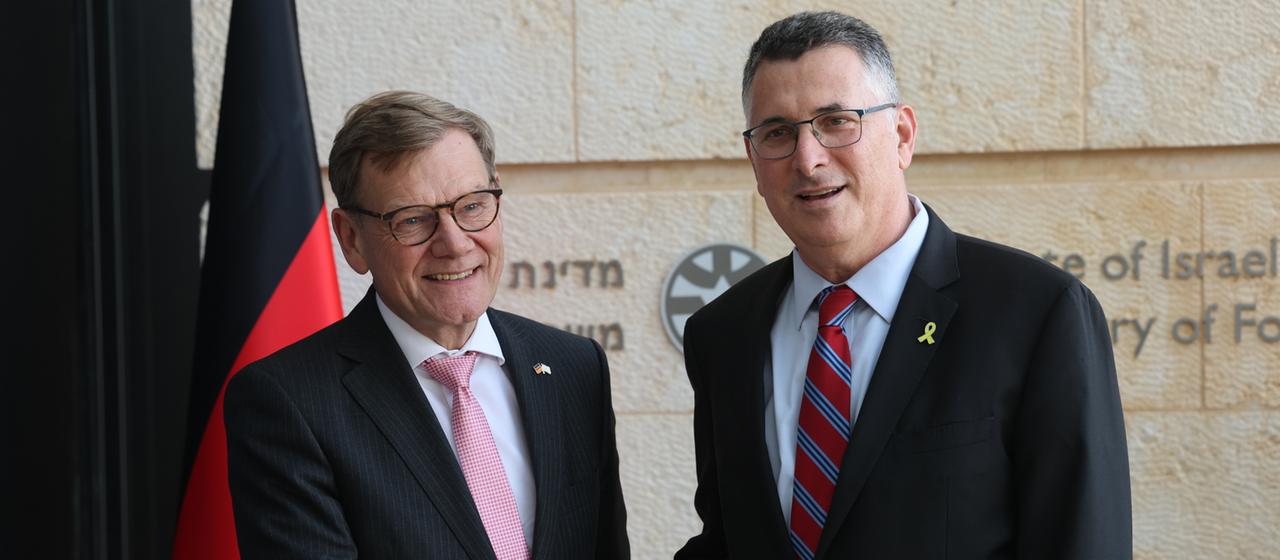
In addition to the US special envoy, the German Foreign Minister also traveled to Israel. Wadephul wants to ensure that sufficient aid supplies reach Gaza. His Israeli counterpart accuses European states of double standards.
Foreign Minister Johann Wadephul has renewed his call for the Israeli government to provide sufficient aid deliveries for the people in the Gaza Strip. Safe land access to the war zone must be established. This is the only way to ensure sufficient aid can reach the people, said the CDU politician, who arrived in Tel Aviv in the afternoon and traveled on to Jerusalem. He urged"the Israeli government to urgently provide the UN and international aid organizations with safe access and, above all, safe and effective distribution."
In Jerusalem, Wadephul also plans to meet with Prime Minister Benjamin Netanyahu and President Yitzhak Herzog. Among other things, they will discuss the situation in the Gaza Strip and ways to end the war. A meeting with Palestinian Authority officials in Ramallah in the West Bank is also planned.
In his statement before departure, the German Foreign Minister stated that Israel must"provide immediate, comprehensive, and sustainable relief for the catastrophic situation in the Gaza Strip." He added that the deaths and suffering there had "assumed unimaginable dimensions." He added that "Germany, too, would be forced to respond" to unilateral steps.
Saar:"We will not be intimidated"
"We will not be intimidated by sanctions or by recognizing a future Palestinian state," the Frankfurter Allgemeine Zeitung quoted Wadephul's counterpart, Gideon Saar, as saying shortly before their meeting. A Palestinian state established today would be"a jihadist terrorist state in the midst of our heartland," Saar said. The Israeli foreign minister welcomed the German government's position."Germany is the only leading country still acting rationally," he said.
In the conversation, Saar also criticized"elements of double standards" in many European states toward his country."For example, you don't hear much about the horrific situation in Sudan or Syria. But there are hysterical and obsessive anti-Israel attitudes."
US envoy Witkoff already on site
US Special Envoy Steve Witkoff also visited Israel. He first met with Prime Minister Benjamin Netanyahu, according to his office. According to media reports, the talks were to focus on the situation in the Gaza Strip, the Israeli hostages held by the Palestinian terrorist organization Hamas, and Iran.
About a week ago, Witkoff announced that the US was recalling its negotiating team from Qatar's capital, Doha. He cited Hamas's lack of willingness to achieve a ceasefire as the reason. The US, along with Qatar and Egypt, is acting as a mediator between Israel and Hamas, as the two warring parties are not speaking directly. Israel also recalled its delegation last week. Israeli media reported that Israel had rejected Hamas's demands for changes to a mediated ceasefire proposal.
The Israeli news portal ynet reported that Witkoff may also visit the Gaza Strip. He hopes to gain an insight into the Gaza Humanitarian Foundation's (GHF) controversial mechanism for distributing aid to the Palestinians.
Barrot criticizes"bloodbath" at distribution points
In light of the situation at distribution centers in the Gaza Strip, French Foreign Minister Jean-Noël Barrot called for the dissolution of the Israeli- and US-backed GHF. This has led to a"carnage" among those seeking aid in front of distribution centers, he told journalists after a meeting with his Cypriot counterpart in Nicosia.
The GHF has been active in the Gaza Strip since May and for weeks was the only organization distributing aid in the Gaza Strip, which is sealed off by Israel. The UN rejects the GHF, which is supported by Israel and the US. They criticize its food distribution as inadequate, dangerous, and biased. Hundreds of Palestinians have been killed trying to reach the distribution centers or receive aid there.
Meanwhile, criticism of the federal government's efforts to date has been voiced in Germany – more than 200 prominent figures believe these efforts are insufficient. They addressed a letter to the government entitled"Don't let Gaza die, Mr. Merz," demanding a tougher stance toward Israel.

